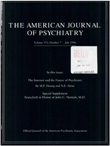Further studies on platelet serotonin transporter binding in depression
Abstract
OBJECTIVE: There is an impressive literature implicating abnormalities in serotonergic neural systems in depression. Many investigators, but not all, have reported low numbers of platelet and brain serotonin (5- HT) transporter sites in drug-free depressed patients. In the present study the authors sought to determine whether the low platelet 5-HT transporter binding in depressed patients is due to previous antidepressant drug exposure. In addition, the binding of both [3H]imipramine and the more specific ligand [3H]paroxetine to the platelet 5-HT transporter was compared in drug-free depressed patients and age- and sex-matched normal comparison subjects. METHOD: In the first experiment blood samples were obtained from 12 depressed patients who had never received antidepressant drugs and 12 normal comparison subjects, and platelet 5-HT transporter binding was measured by using [3H]imipramine. In the second experiment blood samples were obtained from 28 drug-free depressed patients and 28 age- and sex-matched comparison subjects, and platelet 5-HT transporter binding was assessed by using both [3H]imipramine and [3H]paroxetine. RESULTS: In the first experiment the never-medicated depressed patients exhibited fewer platelet [3H]imipramine binding sites than did the comparison subjects. In the second experiment the drug-free depressed patients had fewer platelet binding sites for both [3H]imipramine and [3H]paroxetine than did the comparison subjects. CONCLUSIONS: The low number of platelet [3H]imipramine binding sites does not appear to be due to prior antidepressant drug exposure. The Bmax of platelet binding sites for both [3H]imipramine and [3H]paroxetine, ligands used to measure 5-HT transporter binding, is abnormally low in depressed patients.
Access content
To read the fulltext, please use one of the options below to sign in or purchase access.- Personal login
- Institutional Login
- Sign in via OpenAthens
- Register for access
-
Please login/register if you wish to pair your device and check access availability.
Not a subscriber?
PsychiatryOnline subscription options offer access to the DSM-5 library, books, journals, CME, and patient resources. This all-in-one virtual library provides psychiatrists and mental health professionals with key resources for diagnosis, treatment, research, and professional development.
Need more help? PsychiatryOnline Customer Service may be reached by emailing [email protected] or by calling 800-368-5777 (in the U.S.) or 703-907-7322 (outside the U.S.).



